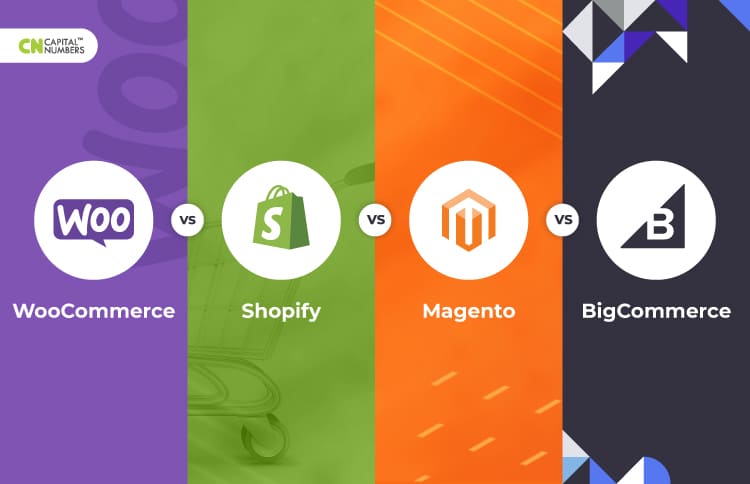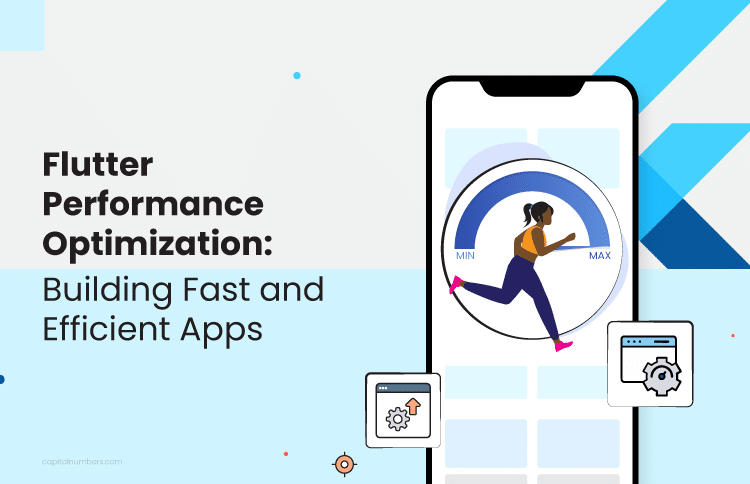WooCommerce vs. Shopify vs. Magento vs. BigCommerce
Table of Contents
Planning to launch your first online store? Or are you looking to upgrade to an e-commerce platform that can handle your growing business? Choosing the right e-commerce platform is one of the most critical decisions you’ll make. The perfect platform can simplify operations, attract more customers, and drive business growth, while the wrong one can leave you struggling with inefficiencies.
Wondering how to make the right choice? We can help you! In this blog, we’ll break down the key features of WooCommerce, Shopify, Magento, and BigCommerce. Whether focused on flexibility, scalability, or advanced e-commerce development capabilities, you’ll find the insights you need to choose the platform that fits your business goals.
Platform Overview
1. WooCommerce
WooCommerce is a plugin designed to turn any WordPress site into a fully functional e-commerce store, making it a highly customizable solution for businesses. It allows you to create a store that fits your needs, from design to functionality. For businesses that already have a WordPress site or prioritize combining blogging with e-commerce, WooCommerce is an excellent choice.
2. Shopify
Shopify is one of the most beginner-friendly e-commerce platforms for online stores and retail POS (point-of-sale) systems. It offers a fully loaded pack of business management tools, including store and inventory management, multiple payment gateways, shipping, customer services, marketing, and reporting. So, Shopify is a good choice for businesses that want an all-in-one e-commerce solution.
3. Magento
Magento is a top choice for large and growing businesses requiring advanced features and high scalability. Even small businesses can benefit from Magento’s adaptability, starting with a solution that fits their needs and scaling effortlessly as they grow. Magento provides unmatched customization and robust support for integrations, making it a versatile choice for businesses with diverse needs.
4. BigCommerce
BigCommerce is a user-friendly e-commerce platform offering an all-in-one solution for businesses. It’s particularly well-suited for businesses with large product catalogs or those looking to scale quickly. Unlike some platforms, BigCommerce includes most features out of the box, reducing the need for third-party apps.
You May Also Read: A Comprehensive Guide on Magento 2 Development for eCommerce Success
Key Differences: WooCommerce vs. Shopify vs. Magento vs. BigCommerce
Ease of Use:
-
- WooCommerce: WooCommerce is easy to use and lets you customize your store the way you want. However, setting it up requires handling hosting, plugins, and updates, which may be technical. It’s ideal for those comfortable with hands-on work or willing to hire support.
- Shopify: It is designed for simplicity and perfect for business owners who want an easy, no-fuss setup. With Shopify handling hosting, security, and updates, you can focus on running your store without worrying about the technical side.
- Magento: It is a powerhouse for large-scale businesses but requires technical expertise. The store setup and maintenance involve advanced configurations, making it a better fit for companies with in-house tech teams or the budget to hire Magento developers.
- BigCommerce: It strikes a balance between ease of use and advanced features. BigCommerce’s user-friendly interface is great for beginners, and the platform manages security and updates. It’s a solid choice for growing businesses looking to scale without technical headaches.
Design and Customization
-
-
- WooCommerce: WooCommerce gives you full control over your store’s design and functionality. With thousands of themes and plugins, you can create a unique shopping experience tailored to your brand. However, customizing your store can require technical expertise or a developer’s assistance.
- Shopify: Shopify makes design simple and accessible for business owners with its drag-and-drop editor and various professionally designed themes. You can customize the look of your store without needing technical skills, creating a polished, user-friendly experience. For those wanting to enhance functionality, Shopify includes features and tools to refine the shopping journey and drive sales effectively.
- Magento: It offers unparalleled control over your store’s design and functionality. The latest version of Magento 2 offers a variety of advanced features, such as an improved page builder, enhanced mobile responsiveness, and advanced inventory management, making it ideal for complex, scalable stores. However, these advanced features often require a team with technical expertise to implement effectively.
- BigCommerce: BigCommerce balances user-friendly design with strong customization tools. Its pre-designed templates are easy to modify, catering to growing businesses that want a professional look without technical complexity. While it doesn’t offer the extensive customization of Magento or WooCommerce, it provides enough flexibility for most needs.
-
Scalability and Performance
-
-
- WooCommerce: It is a flexible platform that lets small businesses grow by adding plugins and customizing their store. However, its scalability depends on the hosting provider’s capabilities, which may need upgrades to handle traffic spikes or large inventories. Performance relies heavily on proper optimization. It is a good choice for businesses with the resources to manage technical needs.
- Shopify: Shopify excels in performance and scalability for its hosted infrastructure. It handles traffic spikes seamlessly and supports businesses growing from small startups to larger enterprises. With its robust backend, Shopify is a great choice for business owners who want worry-free scalability without dealing with technical complexities.
- Magento: It is built for enterprise-level scalability, making it a top choice for businesses managing large inventories and high traffic. One of its standout features is multi-store e-commerce development. This allows businesses to operate multiple stores from a single platform seamlessly. Its advanced architecture includes features like caching and flexible database management to support long-term growth. However, you’ll need skilled developers and high-quality hosting to get the best performance.
- BigCommerce: BigCommerce is highly scalable and built to support growing businesses. Its hosted platform is designed to easily handle traffic spikes and large product catalogs. The platform offers reliable performance without requiring extensive technical management. This makes it a great choice for businesses that want to scale quickly while keeping things simple.
-
Cost Analysis
-
-
- WooCommerce: WooCommerce has low upfront costs as it’s free to use, but you’ll need to set a budget for hosting, domain, and necessary plugins. Hosting requirements vary based on your store size, and as you grow, you may need higher-tier hosting, increasing costs. While there are no subscription fees, ongoing maintenance, and potential developer support can add to the overall expense.
- Shopify: Shopify uses a subscription model with predictable monthly costs. These plans include hosting, security, and support, making it easy to manage upfront expenses. However, transaction fees and paid apps can increase costs over time. Shopify is a good option if you want simplicity and fewer hidden fees.
- Magento: Magento offers a free open-source version, but hosting and infrastructure costs can be high, especially for large-scale stores. Customization often requires hiring developers, which adds to ongoing expenses. Magento’s robust features make it ideal for businesses with the budget to invest in scalable infrastructure.
- BigCommerce: BigCommerce uses an all-in-one pricing model, which includes hosting, security, and support. While slightly more expensive than Shopify, it avoids transaction fees on most plans. It’s a great choice for businesses looking for transparent pricing without the need to manage separate hosting and maintenance costs.
-
SEO and Marketing Tools
-
-
- WooCommerce: It gives you full control over your online store’s SEO. With tools like Yoast SEO, you can optimize metadata, URLs, and sitemaps to improve visibility. Its flexibility also extends to marketing, letting you run email campaigns, create discount codes, and integrate with other tools. However, setting these up might need some technical skills or expert help.
- Shopify: Shopify is great for streamlining SEO and marketing for your online store. It offers built-in tools to manage metadata and sitemaps, and features like email campaigns and abandoned cart recovery to boost sales. With an intuitive dashboard providing customer insights, Shopify makes it easy to grow your business without the hassle of technical details.
- Magento: Magento gives your store advanced SEO tools, such as clean URLs and metadata control, to improve search rankings. It supports sophisticated marketing strategies, including email promotions and discount marketing. However, using these features effectively may require a dedicated team or developer. Magento is perfect for businesses looking to scale while keeping control of their strategies.
- BigCommerce: BigCommerce simplifies SEO and marketing for your online store with easy-to-use tools like customizable URLs and built-in sitemaps. Its marketing features include email campaigns, discount options, and abandoned cart recovery to engage your customers. BigCommerce also offers detailed analytics, giving you the insights needed to grow and refine your store’s performance.
-
Customer Support and Community
-
-
- WooCommerce: WooCommerce offers a strong community where you can find advice and solutions for your online store. There’s no direct support like live chat or phone, but its active forums and developer networks provide plenty of resources. If you need consistent help, hiring a developer or using third-party services is necessary.
- Shopify: Shopify shines with 24/7 support via live chat, email, and phone, making it easy for you to get quick answers. Its large community of users and developers is also a great resource for tips and troubleshooting. This makes Shopify ideal if you want reliable, ongoing support for your store.
- Magento: Magento relies on its developer community to help you troubleshoot and improve your store. While Magento Commerce offers professional support, the open-source version doesn’t include direct help. It’s ideal for businesses with access to skilled developers or in-house technical teams.
- BigCommerce: It gives you reliable support through live chat, email, and phone, available 24/7. Its community of users and developers also offers useful advice for managing your store. If you need consistent and accessible help, BigCommerce is a solid choice for your growing business.
-
Unique Strengths of Each Platform
-
-
- WooCommerce: WooCommerce stands out for its flexibility, making it perfect for content-rich, customizable stores. If you want full control over your store’s design and features, WooCommerce lets you tailor everything to suit your needs. It’s ideal for businesses focused on unique branding and content-driven strategies.
- Shopify: Shopify is known for its ease of use and robust app ecosystem. Setting up your store is quick, and its wide range of apps helps you add features effortlessly. Shopify is a great choice for business owners who want simplicity and an efficient way to enhance their store’s functionality.
- Magento: Magento shines with advanced features and scalability, making it ideal for large or enterprise-level businesses. Its powerful architecture supports complex product catalogs and heavy traffic, giving you the tools to grow without limitations. Magento is best for businesses with technical expertise or resources to manage a sophisticated platform.
- BigCommerce: BigCommerce offers an all-in-one solution that minimizes reliance on third-party tools. It combines ease of use with built-in features for SEO, marketing, and analytics. BigCommerce is perfect for businesses looking for a reliable, out-of-the-box platform that supports growth without added complexity.
-
How to Choose the Right Platform?
The ideal e-commerce platform depends on your business needs, technical expertise, and future goals. For startups and small businesses, ease of use and affordability are key. Shopify stands out for its simplicity, while WooCommerce offers flexibility for businesses. Enterprises often prioritize scalability and advanced features, making Magento an excellent choice. BigCommerce provides a balanced solution with built-in tools, which is ideal for businesses aiming for growth with minimal technical hassle.
Before deciding, consider your budget and available resources. Ask yourself:
-
-
- What’s my budget for setup and maintenance?
- Do I have the technical skills or support to handle customizations?
- Are my goals short-term growth, long-term scalability, or both?
-
You May Also Read: AI in eCommerce: Shaping the Future of Customer Engagement
Final Words
Choosing the right e-commerce platform is all about understanding the strengths and weaknesses of each. WooCommerce is flexible, Shopify is user-friendly, Magento is scalable, and BigCommerce provides a well-rounded solution.
To find the best fit for your business, align your goals, budget, and technical capabilities with the platform’s features. If you’re unsure, consult an expert to ensure you’re selecting a solution that sets your online store up for long-term success. With the right platform, your online store will be up for long-term growth and success.














